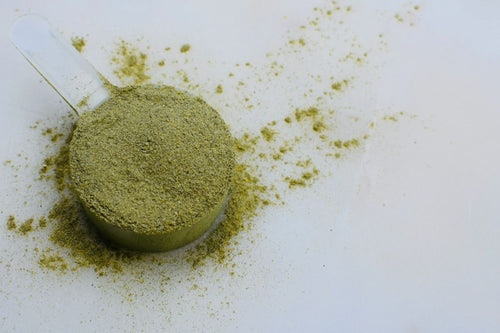For some of us, drifting off to the land of nod is no small feat. If tossing, turning, and overthinking have become a routine part of your bedtime experience, it may be time to consider taking a sleep aid.

While most insomniacs would head straight for the sleeping pills, there is another, perhaps unlikely, supplement that may improve your sleep quality - turmeric.
With almost one in three of us struggling to fall asleep at night, there’s an increasing demand for safe, effective, practical supplements. Could turmeric be the answer?
What Can Turmeric Do For The Body?
Before we launch into how this ayurvedic medicine may improve our sleep, let’s explore turmeric's medicinal properties and benefits on our bodies.
Curcumin is the primary component and active ingredient in turmeric (or curcuma longa), and it’s responsible for most of its documented health benefits. One of the main benefits of turmeric (or curcumin) is its antioxidant properties.

Turmeric And Antioxidants
Antioxidants can help in fighting inflammation and free radicals in the body, reducing our risk of complications, disease, and illness. Turmeric is a natural antioxidant that might help protect us against free radicals, thanks to its chemical structure.
Turmeric And Anti-Inflammatory Properties
Although inflammation is beneficial to our bodies in the short term, chronic inflammation can attack tissues in the body and contribute to the development of some conditions and diseases, including cancer, heart disease, Alzheimer's, degenerative conditions, and more.
Turmeric, specifically the compound curcumin, has anti-inflammatory properties, which could help fight off chronic inflammation.
However, research has shown that results are only noticeable when taking high doses; thus, it’s important to make sure you get enough of this valuable root in your diet to help reduce inflammation.
So Does Turmeric Make You Sleepy?
Turmeric has been widely recognized to encourage sleepiness. Its anxiety-lowering and muscle-relaxation properties help soothe those who take it, making it easier to drift off into a peaceful slumber.
What's more, turmeric's anti-inflammatory agents can work to reduce irritation in the body and create an optimal sleeping environment for a good night's sleep.
Research has confirmed that turmeric extract produces a sedative-hypnotic effect, while its major components such as curcuminoid and bisdemethoxycurcumin have been declared effective sleep promoters.
Can Turmeric Help with Insomnia? What The Research Says
So, we know turmeric can make you sleepy, but what can it do for ensuring sound sleep and treating insomnia? Let’s take a closer look at what the research says.
Turmeric has actually been shown to help with insomnia by promoting better and more restful sleep.
Studies have found that curcuminoids can reduce sleep latency (the time it takes to fall asleep), increase the duration of non-rapid eye movement sleep, and reduce rapid eye movement sleep without altering delta activity.
These effects are believed to be caused by the interaction of curcuminoids with the histamine H1 receptor.
Turmeric may therefore be used as a treatment for insomnia and other sleep disorders. However, further research is still necessary to affirm its efficiency.
Additionally, most poor-quality sleep is produced by factors such as inflammation, pain, and stress, all of which turmeric may help fight off.
We already know that turmeric contains anti-inflammatory properties, but it may also provide some relief for people suffering from chronic pain.
This is especially true for people living with inflammatory conditions such as rheumatoid arthritis. In fact, one study showed that people with rheumatoid arthritis found curcumin to be more effective than anti-inflammatory drugs.
Stress is also one of the leading causes of insomnia. In many patients, high-stress levels can lead to depression, which is closely associated with insomnia and sleep deprivation.
Although people with insomnia are likely to go on to develop depression, the opposite is also true.
Thankfully, curcumin, the active compound in turmeric, has shown some efficacy in the treatment of depression. In one study, sixty participants took either curcumin, Prozac, or both Prozac and curcumin.
The study found that curcumin is as effective as an anti-depressant. Curcumin may also help boost serotonin and dopamine levels in the brain.
Not only does this improve our general mood, but there’s evidence to suggest that increased serotonin and dopamine may also improve our sleep.
This is because serotonin is needed to produce melatonin, and both serotonin and dopamine are involved in our body's sleep-wake cycle.
Does Turmeric Help You Sleep Better Than Sleeping Pills?

With the evidence showing great promise, you may now be wondering: could turmeric be better than sleeping pills? Well, the answer isn’t clear-cut.
We don’t have enough evidence to tell you definitively whether turmeric works better than sleeping pills.
However, if sleeping pills make you drowsy and lethargic the next day, or you’ve had a reaction to sleeping pills in the past, turmeric may be a safer option for you to try.
The answer to this question may also depend on why you’re taking sleeping pills in the first place. There are numerous causes of insomnia, but turmeric may not treat them all.
Turmeric is more likely to improve symptoms of underlying conditions that are causing your insomnia, whereas sleeping pills actively cause sedation and relaxation to promote sleep.
Statistically, this means that sleeping pills are more likely to be effective at improving your sleep quality. Still, it's important to keep in mind that you should consult a doctor before using any sedative or sleep aid, including turmeric.

Five Ways To Try Taking Turmeric For Sleep
If you think turmeric could be the right sleep aid for you, here are five ways that you can try taking it to improve your sleep quality.
1. In Food
Why not try adding turmeric to your recipes? This may seem like a no-brainer, but it’s the most popular way to consume turmeric. Turmeric can be added to curries, lamb chops, chicken, vegetarian dishes, and even pancakes!
2. Tea
If you’ve never considered drinking turmeric tea before, why not give it a go? Turmeric tea can aid digestion and although it can be bought ready-made, it can also be made easily at home.
Plus, it’s so versatile that you can include other delicious (and healthy) compounds, such as orange zest and ginger, for an extra health kick and flavor boost.
3. Supplements
If you're not a fan of the taste and need an easier way to add turmeric to your diet, why not try taking a supplement?
Not only are supplements quicker and more convenient than adding turmeric to your recipes, but supplements also give you a much higher dose, which means more benefits.
If you do take a supplement, look out for a brand that includes a bioavailability enhancer such as black pepper to increase absorption.
4. Smoothies
If you want a deliciously unconventional way to incorporate turmeric into your lifestyle, try adding it to a smoothie.
Turmeric smoothies are fun, tasty, and versatile, so you can include a whole range of ingredients, from bananas and pineapples to carrot juice and even almond milk!
5. Golden Milk (Turmeric Milk)
This delicious turmeric latte – made with turmeric, ginger, black pepper, and your choice of milk or dairy-free alternative – can help ease you into a peaceful slumber.
Simply combine all the ingredients in a pot, heat it gently over the stove, and pour into a mug to savor its comforting warmth before bedtime for an effective natural sleep aid.
So, enjoy a glass of warm golden milk for sleep and wake up feeling deeply rested in the morning.

The Bottom Line
The health benefits of turmeric are no secret - but using it as a treatment for insomnia is a practice that’s not yet widely accepted despite all the findings.
Yes, turmeric may help treat insomnia and improve sleep quality by reducing sleep latency, increasing NREM, and fighting off stress, pain, and inflammation, which are causes of insomnia.
However, more research is needed to confirm just how effective turmeric is at improving our sleep.
Nonetheless, if you’re on the hunt for a new sleep aid, why not try adding turmeric to your daily diet and see if you notice any improvements? Turmeric may just help ease your symptoms and help you drift off with ease.

















